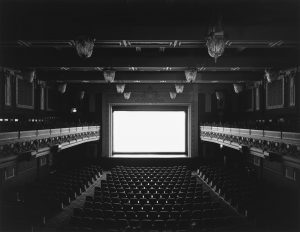
Roland Barthes, the author of ‘The Rustle of Language’, depicted the atmosphere and feelings aroused from the theatre in a third person point of view. “He” always feel that the theatre itself has ‘the classic conditions of hypnosis’, of which making the audience to “dream”. The author mentioned the Brechtian alienation-effect, which involves using the theatrical technique to provoke the audience attention. The argument states that there are various elements go in and out of hypnosis, and all those elements have confluences with the arts, culture and history. Here the author investigates how the darkness of the theatre inside has differed the audience’s attitudes toward the film, by acknowledging an accumulated eroticism in movies.
Darkness often creates a mood of isolation, quiet and tension. It grabs audiences’ mind by putting sound and lighting effects appropriately, so to avoid provoking boringness. The reason for watching films in the theatre is mainly because of the effect (magnificent sound and screen, comfortable seats, etc.) that we could not experience using our laptops or televisions. The intense pressure emitted by such theatrical devices has fascinated audience to step into the theatre. Nevertheless, there are severe situations of leaving the “darkness” before the end of the movie. The reading acknowledged that the audience might “come out of hypnosis” within such long hours of seating in a fixed place, but it might be the issue with the unsatisfied story, or a sudden loss of concentration on the film itself. In other words, the audience is immersed in films because he or she becomes an invisible character of the watching film. And the instrument of such pursuade is what we are mentioning from the beginning – atmosphere.
The darkness is twofold of which might creates a sense of filthy, and this is why the intensity of scare is being doubled. On the other hand, darkness is a perfect place to bring the concentration to the audience. Being as if there is no one nearby rouses the opportunity of involving into films.
Soyeon Park (3035449932)
It is very interesting that you mentioned the idea of the audience being an invisible character of the film. Barthes does not specific a movie theatre or a film in his text, however do you think the genre of film (horror or romantic), type of cinema (IMAX) or techniques (3D) would affect the hypnosis in the contemporary context?